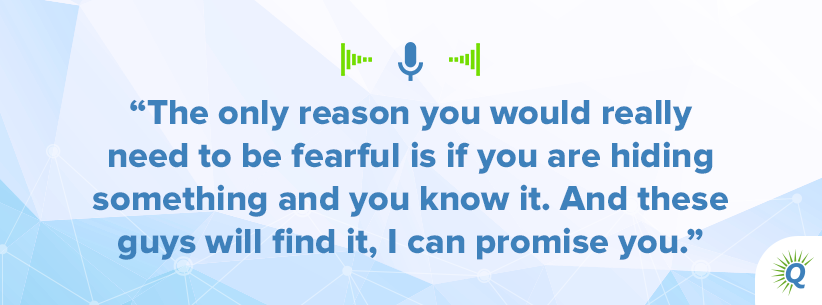Topics:
Never Miss a Beat - Get Updates Direct to Your Inbox
FILTER:


How to Sell Your Business Without Breaking It
By Quiet Light
If you plan to sell a business in the future, the best thing to do now is learn what to expect and prepare for it. This is the second installment in our series which follows one seller’s recent experiences. We’ll look at what really happens after the LOI and how to best position your business for a successful close.
Due diligence – where the road gets bumpy
The asset purchase agreement – keep your foot on the gas
Getting to closing – it’s rarely a bad idea to look out for the other guy
The transition – stay accessible but not too accessible
After the sale – the light at the end of the tunnel
Technology keeps marching on, making our lives easier….
You can learn a new language in a few weeks. You can run a business from a remote island paradise.
You can see who’s ringing your doorbell at home while sitting at your desk at work. You can quickly locate your teenagers no matter where they are on earth.
But can you sell an online business without breaking it?
That, my friends, might challenge you to your core.
After doing it himself, Mike Jackness will tell you that…
Yes, you can. It probably won’t be easy. And it’s well worth the hard work to get to the close.
He sold Colorit.com back in April, after listing it in December.
It’s the second online business he’s built and sold. (the first was treadmill.com)
He set out on the journey to build this one, along with four other brands, back in 2015.
Over at Ecom Crew, he and his partner have been blogging and podcasting about their experiences in ecommerce ever since.
When he’s not doing that, running multiple businesses, or coaching and hosting webinars on Ecom Crew, you can find Mike speaking at ecommerce summits and conferences all over the world.


Listen to the Source of this Post:
This blog post is based on a podcast episode that we recently recorded. Listen to the full episode here:We last checked in with Mike a few months ago to find out what the process was like from the decision to sell a business to accepting an offer.
But what happens after the LOI (Letter of Intent)?
And how do you get from due diligence to the transition and training without losing your mind?
Let’s find out.
Due diligence – where the road gets bumpy
When asked if he worked harder getting the business sold than he worked actually running the business, Mike answers a definitive “Yes.”
After the LOI comes due diligence, a process he felt extremely confident about going in.
As it turned out, “it was a lot less enjoyable than receiving the wire,” he jokes.


Being the perfectionist that he is, Mike knew the accounting and financials for Colorit would hold up perfectly under scrutiny.
As we say often here at Quiet Light, when you sell a business clean financials are critical.
But no business is entirely perfect, of course, and Colorit is a business after all.
With Centurica handling due diligence for the buyers and digging deeply into his P&L, two or three items came up that were a bit off.
“They found stuff that I didn’t even know about my own business,” he says now, “which was really frustrating to me.”
While he’d felt surprisingly calm during the listing and the whole process of getting to LOI, he describes this more taxing part of the process in one word – “unnerving.”
The inevitable emotional part
Luckily, the discrepancies discovered weren’t deal breakers at all, and minor miscalculations aren’t that uncommon.
Was the experience devastating to Mike? Yes.
Did it hurt his position overall? Not at all.


The listing first went out in December. By this time in the process, January and February numbers were up significantly year-over-year, and March was looking strong as well.
Emotionally, Mike was ready to sell but willing to walk away. He knew the price was as low as he’d go and didn’t budge on it.
He also knew that if he held onto the business for another year with the way things were going, he’d be looking at a higher multiple.
“It was getting to a point where,” he says, “in some respects, I was kind of hoping the deal would fall apart just so I could relist it for more money.”
But overall, he knew that it was in his company’s best interest to leave some money on the table now, move forward with the deal, and ultimately hand over a business that the buyers were excited to get their hands on.
Like so many who decide to sell a business, Mike’s decision to wasn’t really about the money, he says, “it was more just a lifestyle adjustment.”


With too much on his plate, something had to give.
Happily, a solid relationship with the buyers paid off, and everything moved on as planned.
The asset purchase agreement – keep your foot on the gas
Joe cautions that the worst thing you can do once you’re under LOI is to have a bad month or two and scare your buyer.
Once you decide to sell a business, you can’t stop running it.
In his case, Mike never took his hands off the wheel or his foot off the gas, and as I mentioned earlier, the business kept growing.
This helped considerably during due diligence but also moving into the next stage of the process – the delivery of a 30-to-40 page asset purchase agreement by the buyers’ attorney.
The task ahead of Mike now was to agree to or edit the terms of the deal proposed by the other side. By handing that 30 to 40 pages over to his attorney.
If he’d gone into due diligence enthusiastically, he went into this stage filled with dread.


He’s been in similar situations before, he says, where the attorneys for the other side drafted completely one-sided and unreasonable agreements.
Painful situations that required tedious negotiations over completely unexpected and unnecessary issues.
This time, however, he was pleasantly surprised. After sending the agreement straight to his attorney, it came back with very little to worry over.
“It made me so happy,” he says, and you can feel the relief in those words.
There were, “a couple small things that had some substance,” he says, but nothing that couldn’t be handled quickly.
Legal fees that he’d expected to reach into the $10-$20k range, wound up at only around $2.5k instead.
Why such a simple go of it?
First, because the business continued at full steam with impressive results. Showing the kind of characteristics that every buyer looks for.
Second, as Joe points out, the attorneys for the buyers were well versed in online business. In fact, Joe had worked with them many times in the past.
They’re attorneys who know how to craft a fair and balanced agreement that won’t weigh so heavily on the side of the buyer that the deal can’t move forward.
Then both sides lose.
In other words, they weren’t deal killers.
For anyone looking to sell a business, Joe recommends working with attorneys with ecommerce specific experience to save time and money.


Mike signed the APA mid-March.But still the deal wouldn’t close for several more weeks.
But still the deal wouldn’t close for several more weeks.
Getting to closing – it’s rarely a bad idea to look out for the other guy
The closer they got to closing day, the more nervous Mike got. But not for the reasons you would think.
He was worried about the buyers being ready for this business to change hands. He was thinking about their well-being, not his.
On their side, they’d just closed on another business and were deep in the weeds of that transition. They trusted Mike, knowing him to be an upstanding guy.
And they knew he was coming to visit for a couple days after closing to help facilitate the transition.
On his side, he thought it was too quiet. Thoughts ran through his mind on the buyer’s behalf.
Where were all the discussions? What about the loan still in the Amazon account? Weren’t they worried?
“Things are just going to start breaking if you aren’t paying attention to things,” he says, and he worried that they weren’t worried.


Mike knew first-hand that not every seller can be trusted. When he’d bought one of his other brands years before, the seller disappeared once the wire went through.
Mike never heard from him again. He was left to get through the transition with the company’s employees.
“This is why we do holdbacks,” points out Joe. Meaning a portion of the funds are held back until after an agreed upon transition.
In this case, of course, Mike was beyond trustworthy and still had the best interest of his business at heart.
The deal closed on April 5th, 60 days after the LOI, and despite his worries, everything went off without a hitch.
The transition – stay accessible but not too accessible
After running a business for four years and building it from the ground up one day at a time, transferring that knowledge and all those processes can be a major challenge.
Processes like:
- Sending orders to Amazon
- Getting an item from China to the 3PL
- Then from the 3PL to Amazon
- Handling a customer service issue
- Running a Facebook ad
“It’s no different than breathing,” Mike says, so it’s hard to break down the individual components and get them across to an outsider who’s not been plugged in from day one.
Mike visited for a couple days and then stayed available afterwards.
![Quote from the podcast: All the different pieces of the business – it all just seems so second nature to me. It’s no different than breathing.]](https://quietlight.com/wp-content/uploads/2019/06/podcast-quote-graphic-4-1.png)
![Quote from the podcast: All the different pieces of the business – it all just seems so second nature to me. It’s no different than breathing.]](https://quietlight.com/wp-content/uploads/2019/06/podcast-quote-graphic-4-1.png)
His goal was clear: “I wanted to feel like when I left there…that they had everything from me to make sure that they were going to be successful.”
Joe’s seen plenty of overzealous buyers in this situation – buyers from the corporate world who’re used to putting in 80 hours a week with maybe a business that now only requires 20.
They jump in with too little training and too much non-stop effort and end up breaking things, he says.
Wait and learn. That would be Joe’s advice.
Mike made extensive lists of steps to go over with his buyers, and in true-Jackness fashion he went above and beyond what they asked for.
After his visit, he stayed available. Still, a month later, he was helping out for 10-15 minutes a day.
After building a strong relationship with these buyers, he knows they’re not out to take advantage of his kindness, and he’s willing to help.
It’s ideal when you sell a business to choose buyers you’re happy to work with and build that relationship early on.
“I gave them every tool possible to be successful,” he says.
Achieving that goal was an important part of the process for him.


After the sale – the light at the end of the tunnel
As I’ve written about before, one aspect of a successful exit that too many entrepreneurs fail to plan for is the post-exit.
In other words, they fail to answer the critical question, “What’s next?”
In Mike’s case, he’d given it quite a bit of thought and had a few main goals for his business life after the exit.
Avoid burnout.
Mike’s theme for this next year is simple… Less is more.
He still has three brands to run and Ecom Crew, yes.
But he’s faced burnout before, and he’d like to avoid it. He realizes that with great success has come a very full plate.
Looking over the past four years of this wild ecommerce ride, he says, “We’ve been successful in spite of ourselves, in spite of running full steam.”
Now he intends to slow down a bit and focus on the activities that bring the most fulfillment.
Be useful.
One thing Mike gets a lot of satisfaction from and plans to continue: teaching and helping other entrepreneurs become successful. It’s definitely one of his passions.
As Joe puts it, “Mike is one of those guys who has been there, done it, and now he’s helping.”
Getting to a place where he knows that he has enough. Gaining the satisfaction of seeing others succeed.
“It’s a net win for the world,” he says.


Take the path of least resistance.
Finally, when it comes to ecommerce, he’ll continue with it. But with a twist – this time he wants to pursue niches and products that he’s personally passionate about.
While Colorit was an amazing business, it was never built around a personal interest of his. Except, of course, a healthy interest in making money.
This time around he’ll do things differently, and he realizes that the whole process of ecommerce is easier when you focus on a field that excites and engages you.
Less work and daily grind. More fun.
Less pursuit of money. More purpose.
Less chasing things. More growing and tending to things that matter.





